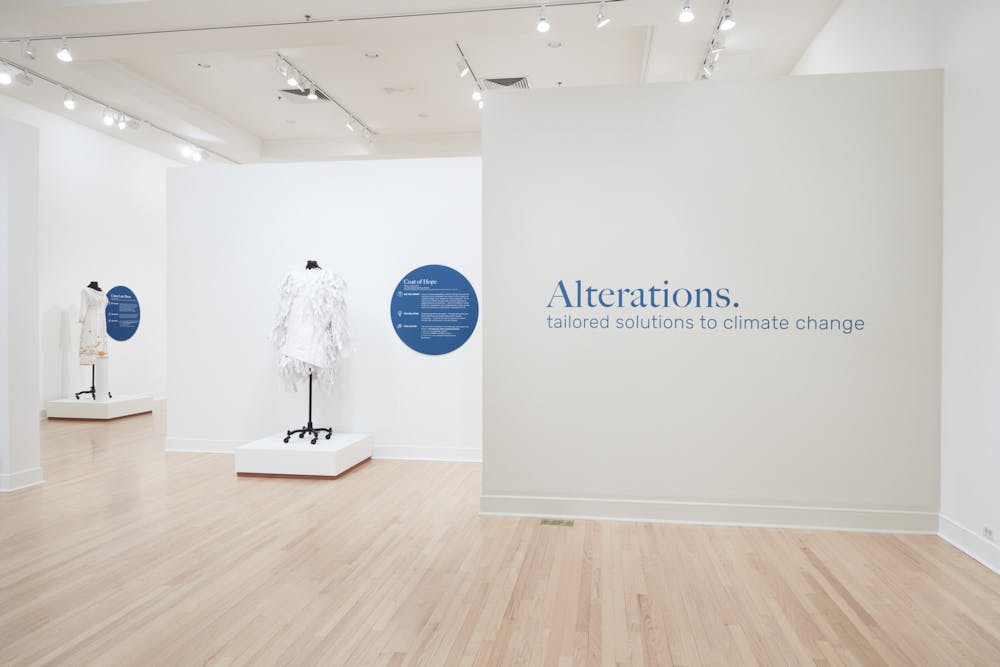Staff members at the Harnett Museum of Art carefully steamed, fluffed and placed 15 art pieces on mannequins before the traveling exhibition opened this semester.
“Alterations. tailored solutions to climate change” features high-fashion sculptures created by artist Nancy Judd.
“When you look closer at them, you can see that they’re made out of found objects,” said Heather Campbell, the University of Richmond’s curator of museum programs. “It’s a whole twist on this idea of reusing things and creating something that is visually beautiful.”
Judd has created sculptures with recycled materials in the past but wanted to make artworks specifically linked to climate change for this exhibit, she said. Her art embodies issues like food consumption, packaging waste and clothing costs, all while providing solutions alongside the art from the Drawdown Ecochallenge, a project that promotes individuals to take action against global warming.
Near the entrance, visitors are greeted with a piece titled “Price of Fashion Collection,” which features three artworks made of materials used in the fashion industry. The center garment is a black dress with clothing tags of different colors and sizes draped around the dress.
“The clothing industry is the second most polluting industry in the world after oil and gas,” the sign on the display reads. “Our clothes contribute to climate change and pollute the air, water and soil during the growing and extraction process, manufacturing, transportation, laundering and disposal.”
Judd said that she hoped her work highlighted the necessity to stop supporting fast fashion and shop sustainably instead. Conscious shopping includes buying clothes only when needed, purchasing second-hand clothes and supporting companies with ethical practices, according to the informational sign.
Farther into the exhibit is a piece titled “Carton Couture,” a white, ruffled skirt paired with a matching top made of food cartons, upcycled tablecloths and scrap canvas.
“Even though many people suffer from hunger, one-third of the food produced in the world is thrown away,” according to the accompanying sign. “Trashing uneaten food squanders resources and generates greenhouse gasses at every stage.”
The sign suggests people inspect for spoilage before trashing food instead of using expiration dates alone.
The exhibit is being shown at a relevant time, as the UR’s Rethink Waste campaign has been promoting sustainability through the Spider Exchange since Jan. 28 and educational social media posts. The campaign, alongside “Alterations,” is showing students how to make eco-friendly choices in their everyday lives.
Although personal accountability is important in the fight against climate change, concentrating on a person’s responsibility to not litter and practice recycling takes the focus away from the role of industries in worsening the climate problem, Judd said.
Enjoy what you're reading?
Signup for our newsletter
“Our time is better spent pressuring industries and the government to not create obsolete trash,” Judd said. “That’s what’s taken us down. If I could redo the exhibit, I would change the focus in that way.”
Her sculptures have captured the attention of UR community members and stimulated conversations about climate change.
First-year Jenna Lapp visited “Alterations” with her Global Studies class and had a moment of realization when she saw Judd’s piece titled “The Trash Man’s Suit,” a suit made of a month’s worth of waste.
“I was thinking, ‘Wow, I really produce a lot of trash, and if I had to wear it, then it’d really show me how wasteful we’ve become,’” Lapp said.
“Alterations” has made her more conscious of her environmental choices and she now tries to make sustainable decisions like the ones described in the exhibit, Lapp said.
“Alterations” will remain on campus through April 22. Visitors can see Judd’s works of art using items such as orange peels, parking tickets and salmon teeth, all while learning about the environment.
Judd said she hoped that the exhibit would engage people “in thinking about this unthinkable concept of the very real possibility of the extinction of the human race in a way that has some hope.”
Contact contributor Ale Egocheaga at ale.egocheaga@richmond.edu.
Support independent student media
You can make a tax-deductible donation by clicking the button below, which takes you to our secure PayPal account. The page is set up to receive contributions in whatever amount you designate. We look forward to using the money we raise to further our mission of providing honest and accurate information to students, faculty, staff, alumni and others in the general public.
Donate Now



